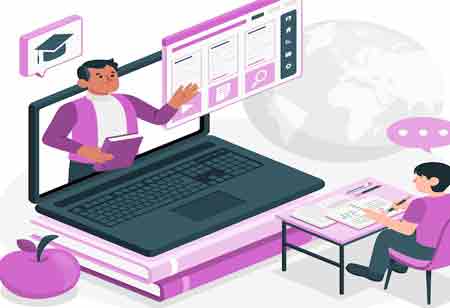THANK YOU FOR SUBSCRIBING
Be first to read the latest tech news, Industry Leader's Insights, and CIO interviews of medium and large enterprises exclusively from Education Technology Insights
EdTech to Transform Education and Raise Standards
The education sector has undergone a significant transformation in recent years, with the emergence of edtech being a crucial driving force.

By
Education Technology Insights | Wednesday, March 15, 2023
Stay ahead of the industry with exclusive feature stories on the top companies, expert insights and the latest news delivered straight to your inbox. Subscribe today.
With its tailored learning experiences, higher accessibility, increased engagement, improved evaluation, and improved collaboration, edtech has the potential to revolutionise education and enhance learning outcomes.
FREMONT, CA: The education sector has undergone a significant transformation in recent years, with the emergence of edtech being a crucial driving force. Edtech, which refers to the integration of technology into education, has the potential to revolutionise the way pupils learn, teachers teach and assess. By leveraging the latest technologies, edtech solutions can deliver personalised learning experiences, improve accessibility, increase engagement, provide better assessment, and enhance collaboration.
One of the significant advantages of edtech is its ability to provide personalised learning experiences. Traditional classroom settings often follow a one-size-fits-all approach that may not be suitable for every student. Edtech tools can tailor learning experiences to students' individual needs, interests, and pace of learning, providing a more effective and engaging learning experience. The use of Edtech also improves accessibility. With the widespread availability of technology and the internet, Edtech solutions can bring education to remote and under-resourced areas, breaking down barriers to learning and providing opportunities to people who may have previously been excluded from education.
Edtech also has the potential to increase engagement. Interactive and multimedia-rich educational content can help to keep students interested and motivated, encouraging them to participate and take ownership of their learning. Edtech tools can also provide better assessment by automating the assessment process, providing instant feedback, and enabling data-driven decision-making. This means that educators can quickly identify areas where students need additional support and provide targeted interventions, resulting in improved learning outcomes.
Furthermore, Edtech can enhance collaboration. Many Edtech tools support collaborative learning, allowing students to work together and learn from each other, developing valuable communication, and teamwork skills.
Edtech can also be particularly beneficial for helping to raise standards in higher education in specialised subjects. Edtech platforms can offer online courses for specialised subjects, providing students with flexible and accessible learning options. Simulation and visualisation tools can provide interactive simulations and visualisations to help students understand complex concepts and theories. Interactive learning resources, such as e-books, videos, and quizzes, can support students' understanding of specialized subjects, while data analysis and interpretation tools can help students develop practical skills and apply their learning to real-world scenarios.
Edtech has the potential to transform education and improve learning outcomes, offering personalised learning experiences, improved accessibility, increased engagement, better assessment, and enhanced collaboration. As the industry continues to evolve, it will be interesting to see how nations leverage edtech to drive innovation and raise education standards in the years ahead.







